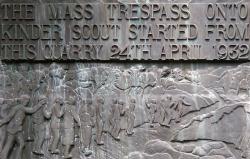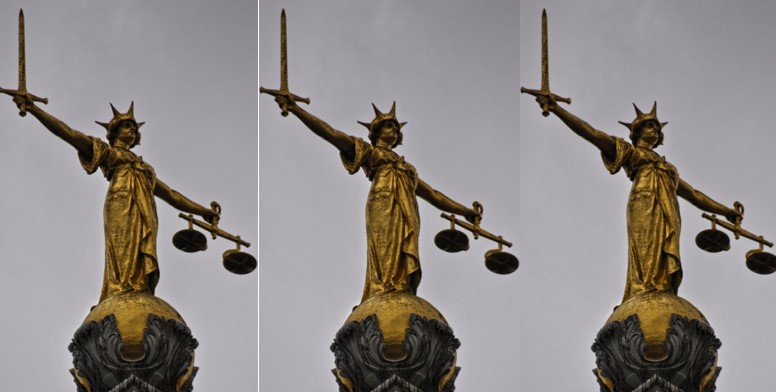By Andy Ford, Warrington South CLP member (and walker)
The Cotswolds can appear to be the stereotypical picture of the English countryside where everyone is part of the “village community” and knows their place. Class conflict is something that happens elsewhere. Some recent court cases give a more truthful picture.
The first concerns a footpath in the picturesque village of Little Rollright, near Chipping Norton, where houses can sell for £2-3 million or more. The footpath used to pass through a scruffy farmyard belonging to the Manor Farm farmhouse dating from the 1600s. However, recently it became the property of Mrs Florence McLeod and her venture capitalist husband. Fact to note: Florence is Rupert Murdoch’s daughter.
The MCleods proceeded to build a pretend Georgian mansion next to the old farmhouse, and to extend a formal garden down towards the footpath. But then they felt that the footpath was now too close to their extended property. They duly proceeded to divert the footpath, without the trouble of following the correct procedure and have built a greenhouse over the route of the path, as well as a bank which walkers have to get over by a rickety ladder. They have unilaterally diverted the path to run between a high bank and the wall of a farm building.
Threatened to build a 2-metre wall
When this was queried by a local Open Spaces activist, Mrs McLeod did what she should have done originally – apply to divert the path. Just to confirm her sense of entitlement, she threatened to build a 2-metre wall right by the path if the decision did not go the right way.
The inspector weighed the loss of enjoyment of walkers and local people versus the privacy and security of these high-profile individuals and decided that only a short section of path was affected; and the footpath diversion was upheld. The campaigners, now backed by the Open Spaces Society, plan to appeal.
The second case is of a crossing over the River Thame, marked as ‘Stepping Stones’ on maps as recently as 2006. In 2002 a local walker and war veteran, Hugh Crawley, claimed a Right of Way across the river which the Tory-majority County Council refused to confirm. Mr Crawley appealed and the Inspector agreed with him, directing Oxfordshire County Council to comply.
At that point the real power, banker and stock market big cheese Sir Victor Blank, emerged. Sir Victor owns Chippinghurst Manor near to where one of the footpaths to the stepping stones runs. Sir Victor and an absentee landowner lodged objections and an enquiry was held.
Right of way “never doubted”
Despite the fact that four footpaths converge on the site of the stepping stones (two on each side of the river) and evidence from local people of having used the stepping stones over decades and of a statement by a senior official of the County Council in 1975 that “I am not sure that this fact [the existence of a Right of Way over the river] has ever been doubted”, the inspector deemed that the claimed stepping stones were probably the remains of an old weir and that there was insufficient evidence of public use of the crossing. So yet again the considerations of rich and influential landowners have won out.
There is a further case is of a landowner in trying to deregister half a hectare of common land next to her property, Pond House, in the quaint village of Uffington in the Vale of the White Horse. She maintained that it had never been common land and its inclusion on the Commons Register was wrong and “harmful to the interests of the owner”. Again, local people objected, but this time the landowner withdrew her application, probably fearing to establish a clear legal fact that the land was indeed common.
Without alerting locals and organisations like the Ramblers and the Open Spaces Society these rich city types, who have bought their way into old farmhouses, mills and barns, would have free rein to block and divert hundreds of paths enjoyed by walkers, local people and ordinary people in general. As it is they’re not doing too badly.
Kinder Scout mass trespass
One of the most successful acts of civil disobedience in British History was the mass trespass at Kinder Scout in Derbyshire in 1932, organised by the British Workers’ Sports Federation, which was a youth branch of the Young Communist League.This mass trespass, aimed to re-affirm a tradition Right of Way, was a coordinated protest involving three groups of walkers who approached Kinder Scout from different directions at the same time. Accounts of the numbers involved vary widely; a Times article suggested that they numbered about 100, whilst one of the key organisers claimed between 600 and 800. In any event, it was a success because Right of Way was established and remains there to this day. For many working-class people walking in the countryside is one of the cheapest and most accessible forms of outdoor pursuit, but it relies on traditional Rights of Way established over centuries. Perhaps we need some mass trespasses in the Cotswolds.
July 1, 2020



